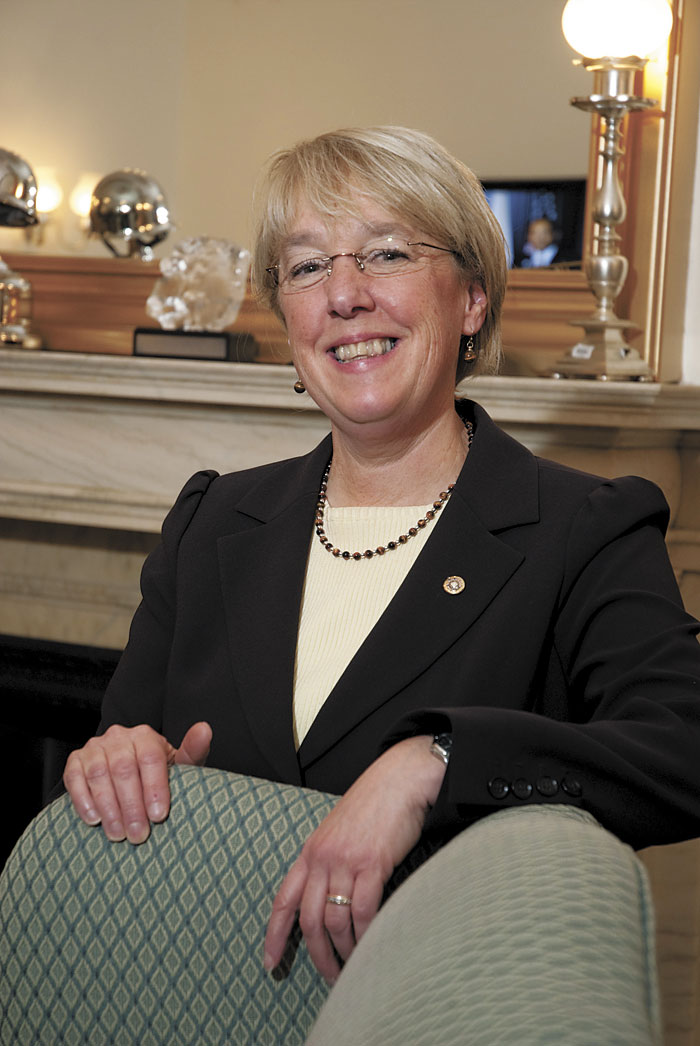Photo by Terry Divyak, Real ChangeJosh Kroeger had lived in the greenbelt on the West slope of Queen Anne for seven months before the city’s sweep (or “clean up” as the mayor prefers to call it) kicked him and another couple dozen homeless people out last month. Now he says he lives down by the Duwamish River. The city says 20 emergency shelter beds have been made available for Kroeger and others forced to leave their camps and that so far only 13 people have taken them up on the offer. Kroeger says he declined because he doesn’t like shelters. “I don’t like being near a lot of people.” Plus, he says, the beds that were promised were basically just mats on the floor. He thinks the others from the encampment, like him, have simply scattered.This morning Kroeger and James Lucas led a meeting to discuss plans for Nickelsville over milk and cereal in the lobby of the Josephinum, a historic downtown building that offers low-income housing. It’s an effort that’s both protest and practical. People need a place to go, argue organizers, and City Hall needs to realize that the current “clean-up” system isn’t working. The plan is to create a permanent homeless encampment that will be built almost overnight in a still undetermined location sometime this summer. The 20 people present this morning belong to subcommittees responsible for logistics like supplies, design, legality, public relations, code of conduct and site selection. There was discussion about becoming a 501(c)(3) and about fundraising efforts. Though there were some at the meeting who, like Kroeger, prefer life in encampments to the institutional nature of shelters, all agreed that the city could use more emergency beds– and that the 20 beds being made available for greenbelt refugees is a joke. “They need to stop ignoring them as if these people don’t exist, stop trying to chase them away,” says Madelynne Bush, who lives in Tent City 4 and is one of the Nickelsville organizers. “What people need to realize is that the average family is one paycheck away from homelessness. I’ve been on both ends of it. It opens your eyes.””Twenty [beds] isn’t enough. When they have those sweeps, what if there are families with kids, or women?” wondered Leo Rhodes, also homeless and a Nickelsville organizer. “Where are they going to go? How can they say there’s beds available when Nightwatch can’t even find any?”Rev. Rick Reynolds, the executive director of Operation Nightwatch, which coordinates with shelters around town to locate open beds everyday, says there were 21 nights in May that they had to turn people away.But the city has no plans to build new shelters, in part because the city and county’s 10-year plan to end homelessness is predicated on the idea that use of shelters will give way to transitional and eventually permanent housing for the homeless. The issue, says Reynolds, is what to do between now and then. “Shelters are an intermediate step. Hopefully long term we won’t need it, but right now they keep people alive.”The city currently funds about 1,000 of Seattle’s 1,729 shelter beds. Marilyn Littlejohn, who manages the mayor’s executive human services team, admits the shelters are more or less full. “There may need to be more,” she says. “But this is a regional problem to solve, not a city problem.”Littlejohn says the city plans to continue the process of identifying unauthorized encampments and “cleaning them up.” The same will go for Nickelsville should it be built, she says.”They’ll arrest us, but hopefully we’ll have enough people that they won’t be able to arrest all of us,” says Lucas. “The city doesn’t seem to want to do anything anymore. We’ve got some 3,000 living on the streets. We want something permanent.”Nickelsville organizers are planning to rally Friday at 5 p.m. at City Hall park, 450 3rd Ave.
More Stories From This Author
Adam Smith and Kim Schrier will retain Congress seats | Election 2024
Smith represents the 9th Congressional District and Schrier represents the 8th Congressional District.
November 5, 2024 9:40 pm
Boeing Machinists approve contract, ending 52-day strike
After voting no twice, 59% of union members approved the latest contract.
By
Michael Henneke • November 5, 2024 8:40 am
Charges filed against teens in King County crime spree
Suspects linked to 78 robberies, shootings and carjackings in Sept. and Oct.
By
Benjamin Leung • October 21, 2024 6:00 pm





